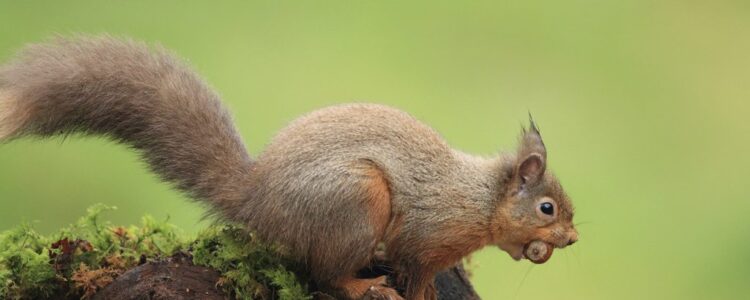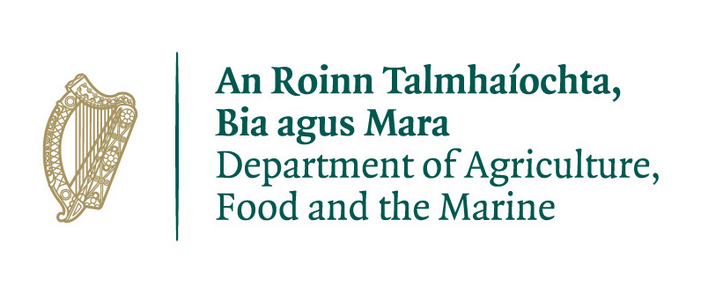
Squirrels
Our native red squirrels colonised Ireland after the last ice age, around 10,000 years ago. Grey squirrels are native to North America and were introduced to this island in 1911. Contrary to popular belief, greys are not responsible for the disappearance of the reds from some areas, although they do compete for food. It was the removal of the ancient forests that caused the red squirrel to become extinct in Ireland. It was reintroduced around 200 years ago but it has struggled to establish itself in a relatively unsuitable habitat. One of the biggest problems for red squirrels (and other wildlife) is that Ireland has the lowest tree cover (6%) in Europe.
The red squirrel is found throughout the woodlands of Ireland. Their habitat is predominantly coniferous woodlands; however, they can live in mixed deciduous and coniferous forests, parks and gardens if there is a sufficient food source. Their diet consists mainly of seeds, such as acorns, spine and spruce seeds, berries and fruits. In Ireland, red squirrels are widespread and common in many areas, but, they are rare or extinct in Meath, Westmeath, Carlow, Louth and Kilkenny.
Squirrels build nest, called dreys, from sticks and foliage in the hollows of old trees and against tree trunks. Each squirrel usually builds more than one drey and may use dreys of other red squirrels in the area. In winter, they do not hibernate but make quick trips to their hoards of seeds which they have collected in autumn and may spend several days in their drey during periods of severe weather.
Red Squirrels can live up to 6 years old in the wild; although, the average in Ireland is 3 years. Mating starts in January or February with a gestation period of 40 days and an average of three kittens per litter. The young are then weaned from 7 to 10 weeks before becoming totally independent, thus in years of ample food, female squirrels may produce a second litter. The offspring of this second will usually stay with the mother throughout winter as sources of food become low.
The grey squirrel has the competitive advantage of spending more time at ground level than the red squirrel. This means that grey squirrels are likely to find red squirrels food stores, resulting in starvation of the red squirrel. The grey squirrel also has the advantage of being able to eat unripe seeds which the red squirrel cannot digest.
In areas of deciduous or mixed woodland it has been found that red squirrels will disappear within 20 years of the introduction of grey squirrels. However, coniferous forests do not provide enough food for the larger grey squirrel and thus populations of red squirrels are unaltered in these areas.
Red Squirrel Crimes
The Red Squirrel is protected by law in the Republic of Ireland under the Wildlife Acts 1976 to 2012 and is listed in the Bern Convention (Appendix III) as a species requiring protection.
Globally it is not afforded further protection as it is a species of least concern in countries which have a healthy population. This may change over time as the presence of greys squirrels in Italy may spread into other European countries.
Unless authorised to do so under a valid licence or permission granted by the Minister for Arts, Heritage and the Gaeltacht under the Wildlife Acts 1976 to 2012 it is unlawful to:-
- Hunt, kill or injure a red squirrel
- Wilfully interfere with or destroy the breeding or resting place of a red squirrel)
- Be in possession of a red squirrel, whether alive or dead, or any part, product or derivative thereof other than one lawfully taken pursuant to the Wildlife Acts
- Sell, keep or offer for sale, or engage in taxidermy in respect of a red squirrel or any parts, products or derivative thereof, other than by a licensed wildlife dealer with a lawfully acquired specimen
Grey Squirrel Crimes
The Grey Squirrel is not a protected species under the Wildlife Acts 1976 to 2012, which basically means that you can hunt and kill it without having to apply for a licence or permission to do so.
The Wildlife Acts do however make provisions that wild animals and wild mammals (which includes the grey squirrel) may not be hunted by various means.
Accordingly the following provision of the Wildlife Acts makes it unlawful to:
- Hunt a grey squirrel by means of a trap, snare or net unless they stand approved for the purposes of this section by virtue of regulations under this section (see Wildlife Act 1976 (Approved Traps, Snares and Nets) Regulations 2003)
- Hunt a grey squirrel by means of any poisonous, poisoned or stupefying bait
- Enter on any land with a firearm or other hunting equipment for the purpose of hunting or trapping a grey squirrel without the permission of the owner or the occupier or some other person entitled to enjoy sporting rights over the land
Issues of cruelty to animals (including grey squirrels) are dealt with in the provisions of the Animal Health and Welfare Act 2013:
Section 12
- Makes it an offence to – (a) do, or fail to do, anything or cause or permit anything to be done to an animal that causes unnecessary suffering to, or endangers the health and welfare of an animal, or (b) neglect, or be reckless, regarding the health and welfare of an animal
In this Act “Unnecessary Suffering” means, in relation an animal, pain, distress or suffering (whether physical or mental) that in its kind or degree, or in its object, or in the circumstances in which it occurs, is unreasonable or unnecessar
INJURED SQUIRRELS
Sick or injured red squirrel may be kept captive for a period of recuperation once granted a licence from the National Parks and Wildlife Service, and subsequently released back into the wild.
Sick or injured grey squirrels may be captured for treatment and recuperation, as it is not a protected species, a licence from the National Parks and Wildlife Service is not required, however, GREY squirrels cannot subsequently be released back into the wild as they are classed as an invasive species.
RELEASE OF GREY SQUIRRELS
Grey squirrels are thought to be carriers of the squirrel pox virus which is almost always fatal to red squirrels but is not usually fatal to grey squirrels. It can be identified by lesions to the face and hands, resulting in the squirrel going blind and dying within a few weeks of infection. To combat the decline in population of red squirrels in areas containing greys the capture and cull of grey squirrels is sometimes carried out by trained personnel using approved traps. It is illegal to release trapped grey squirrels back into the wild. Permits to release grey squirrels may be issued for a specific purpose by the National Parks and Wildlife Service.
Wildlife Licensing Unit,
National Parks and Wildlife Service,
Department of Housing, Local Government and Heritage
National Parks and Wildlife Service
90 King Street North
Dublin 7
D07 N7CV
Email: wildlifelicence@npws.gov.ie
Call: 01 888 2000
Recording evidence at the Crime Scene
Assessing whether a criminal offence has taken place may not always be straight forward and other possibilities such as natural deaths, predation and legal hunting should be considered.
If you come across a wildlife crime scene or a dead bird or object that may be related to a wildlife crime, every piece of information is – or might be – important, but it needs to be recorded properly and accurately for the authorities to have a chance of prosecuting an offender.
Before you do anything else it is very important that:
- You do NOT put yourself in danger by approaching anyone you suspect of committing a crime – they may be violent and/or aggressive.
- You do NOT touch any dead birds or animals. They may be poisoned baits or victims of poisoning. Many poisons (e.g. Carbofuran) are extremely dangerous to us as well as wildlife in even very small amounts and can be absorbed through the skin.
- You do NOT disturb the scene by walking around unnecessarily – small pieces of evidence (cigarette ends, footprints, the marks left by a spade etc) may be lost or trampled into the mud or grass.
- You do NOT move any items at the scene – unless asked to do so or an animal or human”s welfare is/may be compromised by leaving it at the scene.
- You do NOT mark the site (e.g. with a white plastic bag) Although being able to see a marker from a distance might sound like a good idea, it will also alert an offender that someone has been at the site and they might go back and remove evidence.
- You do NOT do anything illegal yourself – leave crime to the criminals!
Record the date and time
- Record the transport
Do this as soon as possible, as suspects can be traced from the registration number
Photograph/write down any vehicle registration numbers that are or might be related to the incident. It is legal to record a registration number if you suspect that the vehicle has been or may be used in a crime. - Record the person
Recording the offender’s face is important of course, but their clothing, the bags they’re carrying, the equipment they’re using are all important too. - Record the scene
Take photographs or video of the scene using a mobile phone or camera etc (or make as accurate a sketch as possible). - If possible try to cover any items, perhaps with vegetation, to make them safe; but make sure you don’t disturb the crime scene in the process!
- If photographing an object, try to put something beside it for scale (e.g. a coin or notebook) providing it won’t disturb the crime scene.
- Record the location
It is particularly important to record locations accurately (apps that provide GPS data are available for most smartphones)
In an urban area note the address or a description of the location. In the countryside take wide angle photographs of any landmarks; a tree, a distinctive fence line, a hill. - Even if in doubt take a photograph and email it to the National Parks and Wildlife Service nature.conservation@chg.gov.ie
Reporting a RED squirrel crime
To report suspected illegal red squirrel activity contact the National Parks & Wildlife Service
Tel: (01) 888 2000
Contact numbers for your local NPWS Conservation Ranger HERE
If you can’t reach NPWS personnel call An Garda Síochána:
If the crime is in progress or about to happen, or if the offender is still at the scene or has just left call 999 or 112
If the event is finished then contact the National Bureau of Criminal Investigation on envi.wildlife.crime@garda.ie and call your local Garda Station (Garda Stations Directory) or the Garda Confidential Telephone Number 1800 666 111
Reporting a GREY squirrel crime
If the crime is in progress or about to happen, or if the offender is still at the scene or has just left call 999 or 112
If you suspect the illegal grey squirrel activity is a breach of the Animal Health and Welfare Act contact Department of Agriculture Animal Welfare Helpline:
1850 211 990 / 01 6072 379 / 0761 064 408
Email: animalwelfare@agriculture.gov.ie
Contact numbers for your local NPWS Conservation Ranger HERE
[Although it will assist the NPWS and Gardaí if you provide as much information as possible, you do not have to give your name if you ring to report an incident.]
| If the squirrel is alive and is injured, also, call a wildlife rehabilitator/vet from the contacts page of Irish Wildlife Matters | Irish Wildlife Matters |
| If you witness any crime involving a squirrel, also contact | Irish Society for the Prevention of Cruelty to Animals (ISPCA) |
For more information on reporting a crime click HERE
